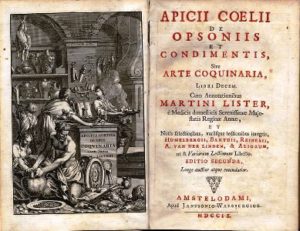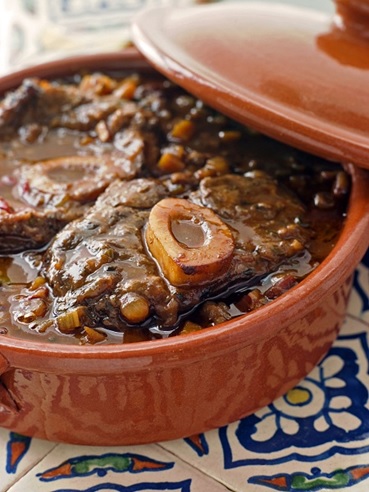
First, a word about the meat. I got the meat shipped from D’Artangnan in NYC. Other great providers that I personally use include Marx Foods. Both are purveyors of great game, meat and other gourmet products. The venison was from New Zealand and it was meaty, beautifully red, moist and delicious. A great start for a great meal.

The text is organized in ten books, most of which, despite their titles, cater largely to the diets and practices of the wealthiest classes, are arranged thus: 1.Epimeles — The Careful Housekeeper; 2.Sarcoptes — The Meat Mincer; 3.Cepuros — The Gardener; 4.Pandecter — Many Ingredients; 5.Ospreon — Pulse; 6.Aeropetes — Birds; 7.Polyteles — The Gourmet; 8.Tetrapus — The Quadruped; 9.Thalassa — The Sea; 10.Halieus — The Fisherman.
The recipe I adapted is from Book 8, Chapter 2 and is named, “Embamma in Cervinam Assam”. It consists of: Pepper, nard leaves, celery seed, onions, green rue, honey, vinegar, broth, dates, raisins and oil. My adaptation follows:
Ancient Roman Marinade for Venison (adapted)
1 cup game or beef stock
1 cup red wine to replace half of beef or game stock (marinade only)
1 tablespoon olive oil
1 teaspoon freshly-ground black pepper
¼ preserved lemon peel – finely sliced
1 cup pomegranate juice
1/3 cup barberries
1 teaspoon celery seeds
1 onion, peeled and finely diced
1 tablespoon honey
2 tablespoons malt vinegar
6 dates, pitted and finely chopped
4 tablespoon raisins
3-4 bay leaves
1 teaspoon rosemary, finely minced
2 sprigs fresh thyme
The biggest changes are the substitution on souring agents. I replaced nard grass and green rue with a combination of preserved lemon, barberries and pomegranate juice. Additionally, I added a few ingredients that are usually associated with modern game marinades. Specifically, I added a few bay leaves, rosemary and a couple of sprigs of thyme.
To marinate 12 venison osso bucco with all of the meat submerged, I trebled the solids and quadrupled the liquids for a delicious marinade. After browning the meat in grapeseed oil, I made a fresh batch of marinade (minus the red wine) to braise in. After the browning and before the braise I cleaned the pot out and sautéed in unsalted butter a mixture of red onions, carrots and celery in a 2:1:1 ratio.
When the meat was done, I strained the cooking liquid and added a mixture of cornstarch and water to make sumptuous gravy.
I served these with a wild mushroom medley (oyster, chanterelles and porcini) lightly flavored with orange zest, fennel and a dash of red wine. Other dishes – cooked by other family members – included a brown and wild rice pilaf, and carrots with butter and honey.
All in all, it was a delicious meal to bring the family together with ties to our ancient, shared past. (Words and ancient recipe adaptation by Laura Kelley. Venison Osso Bucco Prepared by Monkey Business Images @ Dreamstime.com)


I’d like more detail on step by step prep & cooking instructions like on cook times & temp marinade time etc if possible
Thanks
This sounds very close to a marinade I’ve adapted from my French in laws. I leave the venison to marinade over night in the fridge or a cold garage.
what a marvelous blend of flavors. I slow fried on low in bacon drippings. It lent a delighful surprise of flavors as a hot element to my avocado tomato and lettuce salad.
Much like Coq au Vin. Legend has it that Julius Caesar served a Gaul tribal chief a rooster cooked in red wine marinade. The rooster, a symbol of Gaul’s valor, was given to Caesar after the tribe was subdued. In return Caesar invited the tribe chief for dinner and was served his rooster.